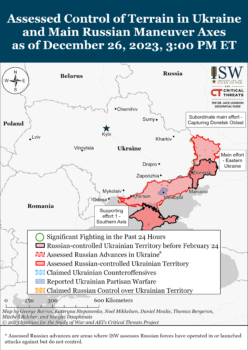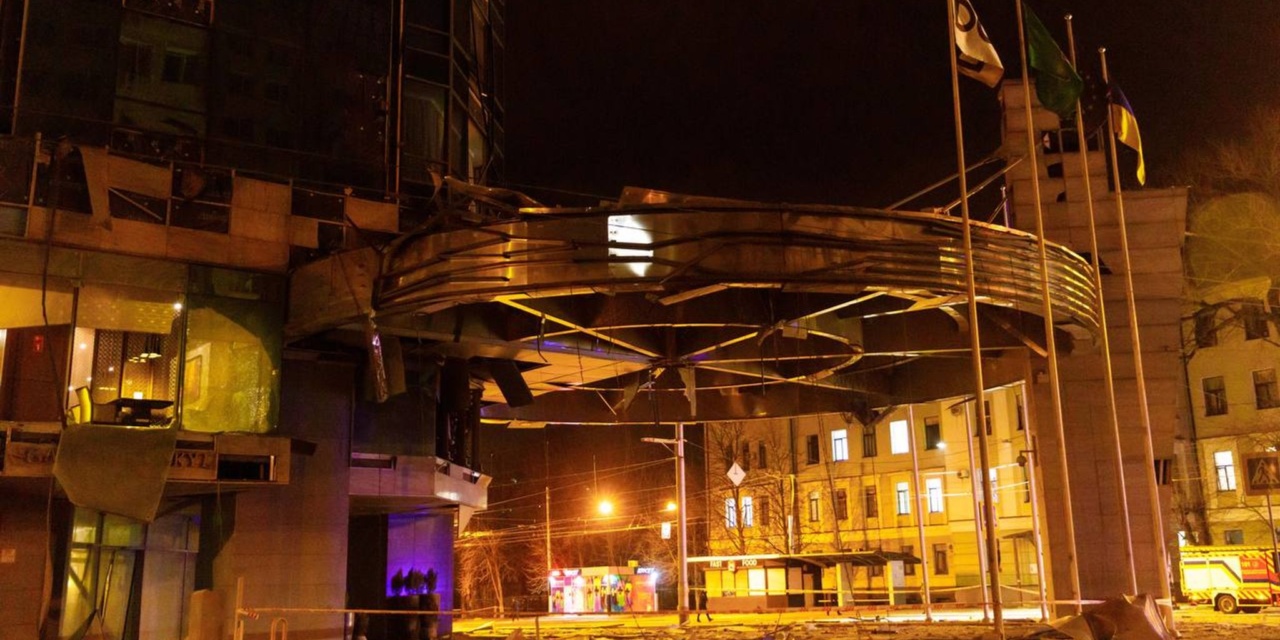Damage from a Russian strike on Kharkiv in northeast Ukraine, December 31, 2023 (Sky)
Saturday’s Coverage: Russia’s Largest Aerial Assault of Invasion Kills 39 and Wounds 160+

Map: Institute for the Study of War
UPDATE 1402 GMT:
Covering up its attacks on civilian sites in Kharkiv in northeast Ukraine — and the setback of explosions within Russia in Belgorod — Russian officials are spreading disinformation that a strike on a hotel killed Ukrainian intelligence officers and military “involved in the planning and execution of the attack on the city of Belgorod”.
Ukraine defense intelligence spokesman Andriy Yusov said the statement was “yet another delusional fantasy from the terrorist regime waging a genocidal war against Ukraine”
As for the latest nonsense from what is called the Ministry of Defense of the aggressor state, we can assure you that no DIU officers, nor any DIU soldiers from Ukraine’s Kraken special unit, were injured during another terrorist attack on Kharkiv yesterday….
The aggressor has once again attacked civilian targets, not military ones. This is a common practice of the Russian Federation and its terrorist missile strikes, which target civilian infrastructure and civilians. All other claims about the imaginary ‘blows’ to DIU are just another sick fantasy of people living in a parallel reality and waging a genocidal war against Ukraine, for which they will undoubtedly be punished.
UPDATE 1112 GMT:
An image of Russia’s overnight destruction in Kharkiv in northeast Ukraine:
This is what the Kharkiv Palace hotel in Kharkiv looks now after being shelled by the occupiers pic.twitter.com/0iCnl9smbW
— NEXTA (@nexta_tv) December 31, 2023
UPDATE 1105 GMT:
The governor of the Belgorod region, Vyacheslav Gladkov, said the toll from Saturday’s explosions has risen to 24 dead and 108 wounded.
He claimed 37 apartment buildings had been damaged.
UPDATE 0758 GMT:
Kremlin documents confirm that Sergey Kiriyenko, the Deputy Chief of Staff to Vladimir Putin, is overseeing operations to foment political discord in France.
The documents, obtained by a European security service and reviewed by The Washington Post, depict a campaign seeking to use French political figures, opinion leaders, and activists to undermine support for Ukraine and to weaken NATO.
The effort complements similar political warfare inside Germany — revealed in April — where the Kremlin has tried to bring together the far right and the far left in support of Putin’s invasion of Ukraine.
See also Kremlin Plot: A “Germany Front” Breaking Support For Ukraine
In weekly “dashboard” presentations to Kremlin officials in 2022, strategists said France was vulnerable to political turmoil. They noted polls showing 30% of the French population retained a positive view of Russia, the second highest figure among Western European countries after Italy. About 40% were inclined not to believe reporting on Ukraine by France’s own mass media.
The strategists disseminated talking points that Western sanctions against Russia have damaged the French economy through a decline in trade, leaving the country at risk of falling into “the deepest social and economic crisis of recent years”. Pro-Kremlin activists should assert that the supply of arms to Ukraine has left France without weapons to defend itself. Troll farms would produce social media content and articles critical of Western support for Kyiv.
Kiriyenko’s office ordered messaging that would increase the number of those in France reluctant to “pay for another country’s war”. The campaign would increase “the fear of direct of confrontation with Russia and the start of World War III with Europe’s participation”, and build a bloc wanting “dialogue with Russia on the construction of a common European security architectur”. The US would be stigmatized for using Ukraine as an instrument to weaken Russia’s position in Europe.
Kremlin spokesman Dmitry Peskov insisted that the leaked Kremlin documents sounded like “no more than the latest fake or total rubbish”. He said Kiriyenko focuses on domestic politics, and maintained that “it is clear to all analysts” that “the whole of Europe is suffering” from sanctions on Russia “and there doesn’t need to be any promotion of this”.
ORIGINAL ENTRY: Two days after the largest missile and drone strikes of Vladimir Putin’s 22-month invasion, Russia has again attacked Ukraine’s capital Kyiv and second city Kharkiv.
The Ukraine Air Force said Russia launched 49 Iran-made Shahed “kamikaze” drones, 21 of which were downed.
The UAVs were fired from Cape Chauda in occupied Crimea and from the Primorsko-Akhtarsk area and Kursk region inside Russia.
At least six missiles hit Kharkiv in the northeast of the country, injuring at least 26 people, including two boys aged 14 and 16. Twelve apartment buildings, 13 residential houses, and a kindergarten were hit.
The toll for Friday’s assault, with 117 missiles and 36 drones, has risen to 41 killed.
Kharkiv Mayor Ihor Terekhov said early Sunday, “On the eve of the New Year, the Russians want to intimidate our city, but we are not scared – we are unbreakable and invincible.”
Ukraine President Volodymyr Zelenskiy also referred to the ongoing attacks in his nightly address to the nation:
For every such strike in Kharkiv, in our Kherson region, in the cities and villages of Donetsk, Zaporizhzhia regions….For all strikes in Odesa, Sumy region, Kyiv, and all our other cities and regions. For every Shahed drone, for every Russian missile, there will be a fair responsibility of the terrorist state. Both political and very practical.
Whatever happens in other countries, whatever political changes or moods, we must have sufficient potential to do our thing, to achieve our goals.
We will be fighting for our influence and for justice for Ukraine, and I am grateful to all the leaders who are assisting us, who… pic.twitter.com/6V2Ln3aX8i
— Volodymyr Zelenskyy / Володимир Зеленський (@ZelenskyyUa) December 30, 2023
Conflicting Accounts Over Belgorod Explosions
Russian officials said explosions on Saturday in the center of Belgorod, near the border with northern Ukraine, killed 21 people — including three children — and injured 110 more.
The officials declared a Ukrainian attack on sites including a skating rink on the central Cathedral Square, a shopping center, residential buildings, and a car.
A “Ukrainian security source” said more than 70 drones were launched against Russian targets, as a “response to Russia’s terrorist attacks on Ukrainian cities and civilians” on Friday.
However, he said the Belgorod explosions were from the “incompetent work of Russian air defense”.
The Russian Defense Ministry acknowledged that “cluster parts from the downed [Ukrainian] Vilkha missiles hit the city of Belgorod”.


Trackbacks/Pingbacks